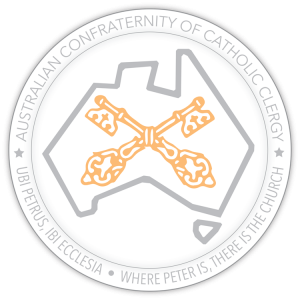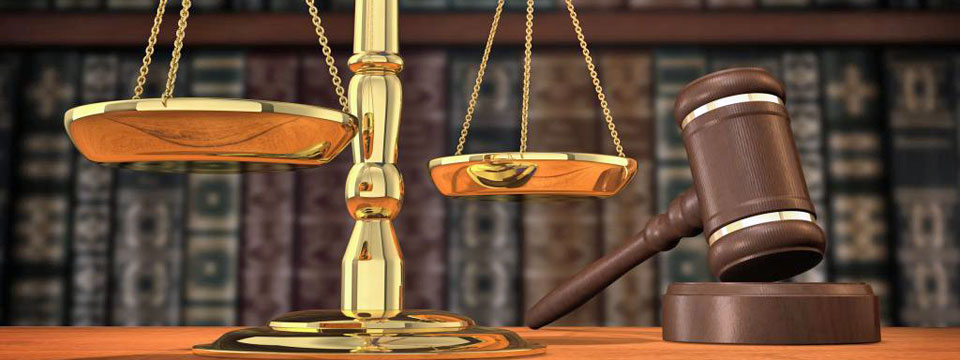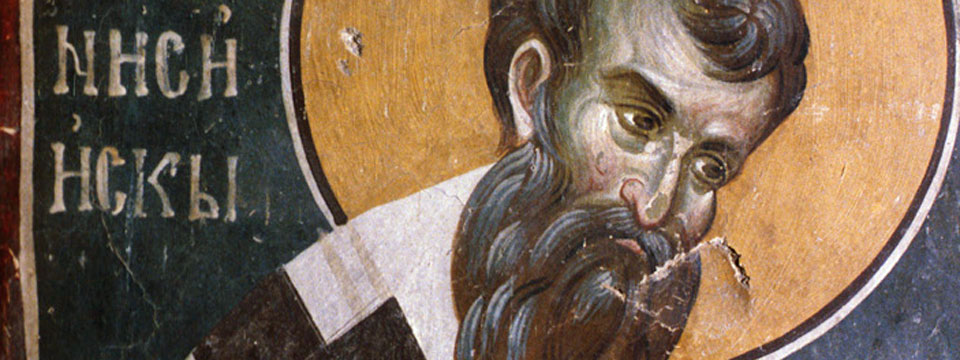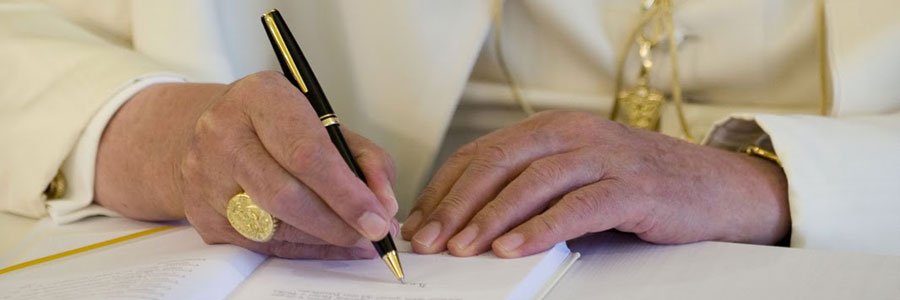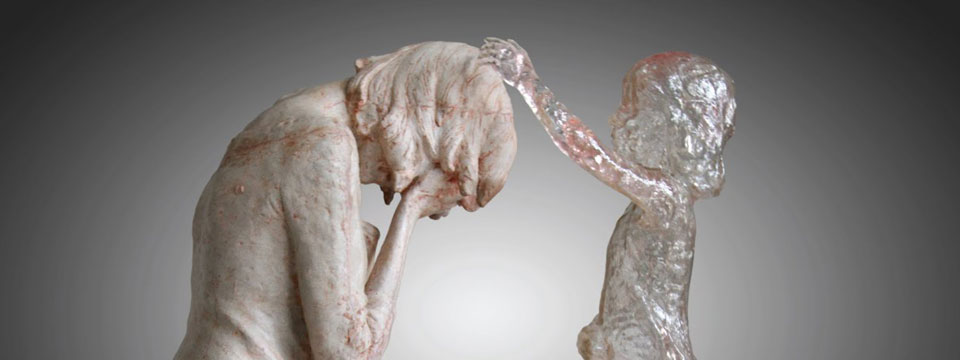This talk was introduced by the Rev Dr John Doherty, Parish Priest of Oatley in the Archdiocese of Sydney and a member of the Tribunal of the Province of New South Wales. During his introduction, and in subsequent answers to questions, he made strong reference to his earlier article (Doherty and Wellspring) published in The Priest in May 2007 and to the article of Mgr McDaid published in November 2005.
As a context to Mr Woodward’s paper, Fr Doherty said that he had formed the opinion that the inadequate protections in the Church protocols used in Australia – termed “Toward Healing” – meant that priests accused of violations under these protocols could receive justice and be treated with proper dignity only through civil law processes. He thus saw the positions taken in Mr Woodward’s presentation as valuable, necessary, and indeed indispensable, for priests who face allegations under the these protocols. In introducing his paper, John Woodward extended the remarks of Fr Doherty by saying that he sees the Church as under insidious and sometimes implicit attack that calls for Christian leadership in defending the rights of persons before the law. (Editor)
The rights of persons before the law
The Institutional Church of which I have been an active member for more than fifty years and upon which you rely for your livelihood and daily bread, is under attack. In a secular world in which Christian values and ethics have been abandoned in favour of material expediency and consumerism, that is perhaps not a very surprising statement. Nor is it particularly novel because Church history throughout the ages is punctuated with stories of attack, wars, scandals, heresy and intrigue of every kind.
What is novel about the present invasion of the Institutional Church is that it comes not from the traditional external sources that one might expect but rather from a much deeper, less obvious and more insidious malaise which is eating away at us from within like a cancerous growth which threatens our very existence. In its most tangible form it is visible in the Church’s response, or lack of adequate response, to the evils of child sexual abuse by clergy and members of religious orders. It is also evident in the Church’s handling of matters of professional integrity.
I have separated these two areas of concern quite deliberately because, notwithstanding that in many cases there will be some overlapping where conduct that is of one character is also of the other character, the converse is not always true. In fact it is rarely true. Every case of child sexual abuse by a member of the clergy is both a gross breach of professional responsibility and a crime against the State. But not all breaches of professional responsibility amount to criminal liability.
Take the example of the parish priest who enters into a heterosexual personal relationship with an adult member of his parish. Such conduct amounts to a breach of professional [and moral] responsibility because it transgresses the Church rule of clerical celibacy and it is outside the norms or expectations of the Church community. But it is not a crime and does not expose the priest to a risk of criminal prosecution. If exposed, the likely consequences are that the priest may be called upon to account for his conduct to the Professional Standards Office and he may be put on administrative leave or moved to another parish or other duties. Ultimately he may effectively be suspended from ministry permanently after a “Towards Healing” process.
If we change the example by substituting the heterosexual relationship for a homosexual relationship with an adult male member of his parish, the conduct immediately becomes more sinister, arguably a greater breach of professional responsibility and liable to more severe sanctions at the hand of the Bishop, as advised by the Professional Standards Office. The conduct is still not a crime although it would have been if it occurred thirty years ago.
If we now further change the example by substituting for the adult homosexual parishioner, a young homosexual manofabout17or18yearsofage,weareinavery difficult territory. Firstly, the professional responsibility issues include that there is a breach of trust by reason of the age differential and the power imbalance between the priest and his parishioner.
Secondly, the police will be taking a keen interest in the matter with particular reference to the precise age of the parishioner and, if he is over 18, the duration of the relationship and whether the parishioner was “groomed” by the priest in anticipation of his eighteenth birthday. Thirdly, the conduct is reportable conduct within the meaning of Section 25C of the Ombudsmen Act, 1974.
The “Towards Healing” Protocol
The current “Toward Healing” protocol was published under the auspices of the Episcopal Conference of Australia in 2000 and its current edition is dated June 2008. In all of the examples cited above, the Church’s response has been the same notwithstanding that the circumstances and consequences in civil law are quite different and provide a range of different levels of exposure to criminal prosecution ranging from zero in the first example through to almost certainty in the latter example. The response has come in the form of the “Towards Healing” protocols document which makes no distinction between misconduct amounting only to breaches of professional integrity on the one hand and matters deserving of criminal investigation on the other. Nor, insofar as “Toward Healing” deals with matters of criminal liability, does it pay anything other than lip service to the presumption of innocence which is fundamental to the civil criminal law. At clause 14 it says:
“Concealing the truth is unjust to victims, a disservice to offenders and damaging to the whole Church community.”
Significantly, “Toward Healing” does not say with sufficient specificity that concealing the truth by alleged victims may be grossly unjust to alleged offenders, or result in their wrongful imprisonment and the payment of a large sum of money by the whole Church community to someone who is not truly and justly entitled to it. Indeed, “Toward Healing” as a framework seems to be predicated on the basis that an allegation will be established – and such an approach is indefensible from a correct understanding both of civil law and of natural justice.
True it is that elsewhere (at clause 38.5) in “Towards Healing” there is provision for a process which includes notification to an accused of the fact and nature of a complaint and which declares his/her entitlement to be advised of rights, the details of the process and the offer of a support person. However, nowhere in the “Toward Healing” document is there to be found any explanation of the rights of a person subject to an allegation, how these rights may be exercised or the consequences which may flow from the accused person’s decision whether or not to exercise those rights.
Critically, nowhere in the document does it say that if the accused agrees to cooperate with the investigation and provide a written statement to the appointed investigator, that statement may later be seized by police acting under the authority of a search warrant and used in evidence at a criminal trial of charges only remotely related to the subject of the investigation. Nowhere does it say that if, upon the completion of the investigation and the acceptance of the Bishop’s recommendation, the accused attends a course of counselling, psychotherapy or other recommended treatment, the police, acting under the authority of a search warrant, may raid the Professional Standards Office and seize the accused person’s entire file and every piece of paper that has ever come into existence about him/ her including medical reports, reports to the Bishop, correspondence and anything else which happens to be on the file, and regardless of whether it is “confidential” or “personal” or whatever. (And this has happened in my diocese.)
The autumn 2008 edition of The Swag (published by the National Council of Priests) (NCP) carried an article called “Innocent Priest in the Dock”. This highlights in graphic form some of the consequences which flow from the fact that the Church has allowed a blurring of the distinction between issues of professional standards on the one hand, and allegations of criminal misconduct on the other. What is particularly disturbing about that article is that it is typical of a scenario that is being played out in dioceses all over the country, and indeed throughout the western world and we have thus far been powerless to correct it.
Breaches of Professional Standards and crimes against the State
Actions against professionals for breaches of professional standards are commonplace in today’s society. They are not peculiar to those who exercise ministry in the Church or employees of the Church. In the civil law they form a large part of work which is described as Administrative Law and are often determined by judicial or quasi judicial bodies which are set up to investigate and resolve issues of professional standards within particular fields of professional discipline. For example, in New South Wales, we have the Health Care Complaints Commission which deals with health care professionals and the Administrative Decisions Tribunal which deals with complaints against solicitors and barristers.
In dealing with matters which are before them for consideration these administrative tribunals perform a protective function, not a punitive one. Their role is to protect members of the public from dealing with unscrupulous or inept professionals, not to punish them. In Law Society of New South Wales v Farr ([2009] NSWADT 108) the Administrative Decisions Tribunal of New South Wales said: “The obligation placed upon the Tribunal is to protect the interests of the public. It is not a punitive role, nor is the respondent deserving of punishment…” Courts and tribunals throughout the nation have expressed similar views in relation to proceedings for breach of professional standards. The civil law in that regard is well settled.
The distinction between professional standards (“protocols”) and breaches thereof and criminal acts is essential. This distinction flows over to distinctions between the protection of the public (by maintaining professional protocols) on the one hand, and punitive and corrective functions of the state in matters criminal on the other hand. These distinctions are crucial in the context of the current debate is because the civil law affords different levels of protection to an accused person, and calls for different standards of proof , depending on the character of the case being met and the hazards or constraints which follow from an adverse finding against him. For example, the right to remain silent and the right to not partake in a record of interview are entirely appropriate rights which the law will protect in criminal cases where an uninformed and/or inadvertent admission may result in a criminal conviction, loss of personal liberty and imprisonment for many years. It would be quite another thing for a lawyer charged with misappropriating trust funds to claim a right of silence and refuse to give an explanation to the Trust account auditor sent to investigate the matter. Such a posture may well save him from criminal liability but would not save him from being found to have breached professional standards and being struck off the roll of legal practitioners not as a punishment but for the protection of the public.
Similarly, a parish priest who enters into a heterosexual personal relationship with a member of his parish is exposed to the risk of an action against him for breach of his professional responsibilities to the parish and to the wider Church community. He is not thereby at risk of any criminal action unless his conduct is otherwise against the criminal law (such as, for example, would be the case if the other party was a minor or there was some question as to whether she had consented to sexual contact with him).
The “Towards Healing” Protocol and Professional Standards
The problem is that the same “Towards Healing” protocol which was set up by the Episcopal Conference in response to allegations of child sex abuse and sexual assault is being invoked to deal with the matter of professional standards generally. The resulting confusion is well illustrated by an article “Innocent Priest in the Dock” authored under the pen name of “Pastor Ignotus”. In the first place, “Pastor Ignotus” was summoned to the office of the “Standard Resources Group” in circumstances which might reasonably carry the inference that he was to face some professional standards complaint or other. Secondly, when he arrived there the Director immediately confronted him with a question (undoubtedly referable to criminal behaviour) which should not have been put without firstly warning him of his right to remain silent and the risk to his liberty of waiving that right. Thirdly, contrary to the express provisions of “Towards Healing”, clause 46, he was immediately presumed guilty and treated as a convicted criminal. Fourthly, he was not advised that any written material which comes into existence, whether by way of denial, explanation, apology, or medical, psychological or other report, would be available to be used as evidence against him in a future criminal trial. (And, in the case in question, it was used in criminal processes.)
In the context of the events which followed, it is little wonder that “Pastor Ignotus” found himself charged with criminal conduct which consumed five years of his life, countless thousands of dollars in legal expenses and deprived him of his life in public ministry for what was effectively the rest of his working life. For what in truth was happening was that he and the other functionaries of the Church, including the Encompass staff who considered the matter and reported to his Bishop, were (perhaps inadvertently) laying a paper trail of “voluntary” evidence which relieved the police of the burden of giving any statutory warning of the right to silence. The process facilitated the Church to gather evidence unwittingly without any warning whatever or advertence to the possible consequences of a civil law process.
To exacerbate matters even further, it is highly likely that such evidence as was gathered by the Church and later seized by the police, was circumstantial, was evidence of suspicion and innuendo rather than any evidence of wrongdoing. “If he was not guilty why did he agree to go to Encompass?” Well, perhaps he agreed to go to Encompass because his Bishop recommended it and he felt, in the context of a professional standards enquiry, that if he chose to decline the recommendation, he might be removed from ministry in the interests of protecting his parishioners from perceived risk. Whatever about the outcome, it is clear that the process was confusing and the real victim in the case was the accused, not the accuser.
The Role of the Media
Prosecutions against the clergy, other religious, footballers, lawyers, judges, politicians and social celebrities face an additional hurdle in obtaining a fair trial according to law. Indeed one of the most insidious weapons in the arsenal of police investigators in the news media. “Pastor Ignotus” makes brief reference to it at page 35 in his article when he says: “Before I made my first appearance in court the local media knew all about the charges, the details presumably supplied by the police.” Criminal law trials are before a judge and 12 jurors – persons who read the newspapers and view television, and so the media become available as an insidious weapon to Police. Implicit in the presumption of this accused person is that the local media did not consult him to enquire whether he would like to respond to the police allegations or otherwise be heard or given equal space so that the media might present a balanced view of the story.
The media factor is insidious because it permeates the lives of the guilty and innocent alike without regard to the objective truth of the matter and often in breach of the Media Alliance Code of Ethics #8, their own code of ethics to: “…Use fair, responsible and honest means to obtain material…” and “Never (to) exploit a person’s vulnerability or ignorance of media practice.” These provisions are rarely observed, and wide media coverage is common in portraying offences (especially against children), but rarely is a finding in favour of the accused given any media coverage.
It is a weapon because, prior to arresting a “profile” defendant, police routinely summon representatives of the media to the police station for a “media briefing” at which (in the absence of the accused person and before he is even aware that he is to be charged) they outline the specifics of the allegations in a way that most favours their case.
By the time the accused person is charged journalists are filing their reports which are then disseminated via radio, television and newsprint throughout the land to potential jurors who will one day recall that they remember the story which is unfolding before them in the Court room because that have already heard about it in the media. Whatever the directions of the trial judge, the media often generates predispositions and prejudices that work against a fair trial.
What can be done?
There are a number of steps which should be taken by any member of the clergy or religious order facing a professional standards enquiry, however informal the process might appear. They are:
1. Always assume the worst
Assume that there will be police involvement and that every piece of paper which has come into existence about you may find its way to the police and to a civil court. The word “confidential” or similar words on documents (including file notes and psychological reports) mean nothing to the civil law unless the document is otherwise legally privileged from production.
2. Say nothing until …
Say nothing until there has been a clear statement of exactly what is alleged of you. Insist in getting it in writing and of reserving your rights to say nothing until the allegation has been articulated precisely, in writing and you have obtained professional advice. In the case of a Bishop, he should present exactly and in writing what is alleged.
3. Immediately contact a canonist
Immediately contact a canonist and seek his advice. Deal with the Bishop or Local Ordinary through him.
4. Immediately contact a civil lawyer
Further to (1) above, immediately contact a civil lawyer, preferably one who has experience in dealing with matters of this kind and who is a Catholic or who is familiar with the faith and culture of the Catholic Church. Both the person who is the subject of an allegation and his Bishop should gain a detailed understanding of the relevant provisions both of canon and of civil law, and be scrupulous in following procedural fairness.
5. Practice justice, including for yourself
In the longer term, take seriously what the Church has said in relation to matters of social justice and human rights and be critical in your thinking and vocal in your opposition to abuses wherever they are found. Do not forget that abuses of human rights, however subtle and by whomever they are perpetrated, are offensive to the Gospel and to the teachings of the Church. Priests generally are very good at living out the principles of the Gospel. It is essential that priests (and Bishops) lead us now – by taking care of one another; by being strong in claiming due rights for clergy; and by being vocal in enunciating those principles for individuals and for the Church as an organisation.
Some conclusions
Nothing which is written in this paper should in any way be construed as endorsing, condoning or acquiescing in inappropriate or wrongful sexual conduct, whether it is in breach of professional standards or within the context of more serious criminal conduct. The Church has quite properly roundly condemned such behaviour and has moved to eradicate it wherever it is found. We are , however, a great Church, and the misconduct of some aberrant individuals must not be allowed to obscure the fact that, in this country, criminal liability is judged by individual behaviour, not by association. One should be adjudged guilty or not guilty upon the basis of admissible evidence properly adduced and tested before a Judge and jury, not by suspicion and innuendo or popular opinion forged by sensationalist reporting in the tabloid press.
It is individual people who are convicted of crime not Church organisations. Priests and religious, even those who are guilty, are entitled to the protection of the law and due process of law. It is submitted that, in our haste to eradicate the scandalous behaviour of some aberrant individuals, we have perhaps overlooked the more fundamental rights which religious share with all other people in our community. Those are the rights to personal liberty, procedural fairness, the presumption of innocence, freedom from undue interference from the State, and above all, the right to be accorded natural justice.
The protection of the vulnerable, and indeed the community at large, is not advanced by denying to individuals the basic right to be informed in a timely manner of any alleged wrongdoing and the right to make reply.
